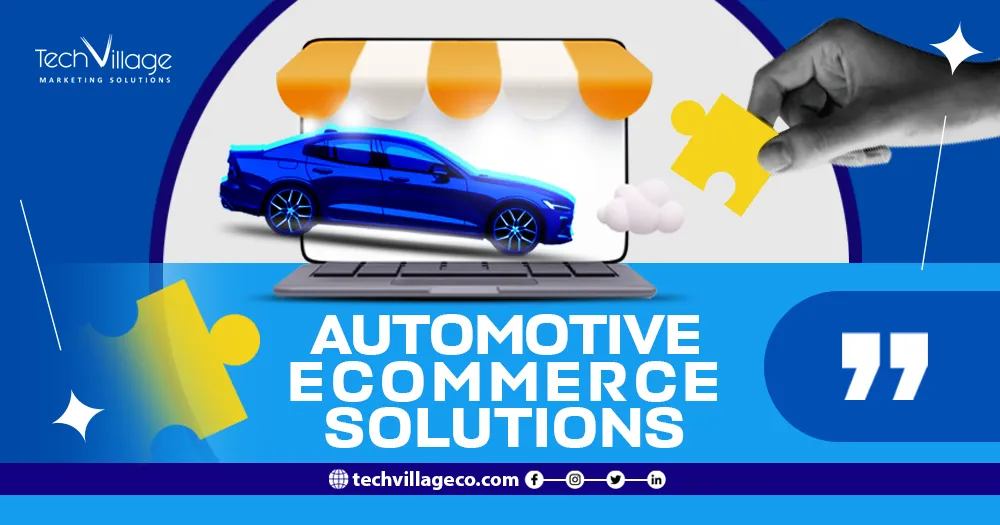Automotive ecommerce solutions represent a transformative shift in the way we buy, sell, and interact with vehicles and their related products and services. In recent years, the automotive industry has witnessed a digital revolution, with consumers increasingly turning to online platforms to research, purchase, and maintain their cars.
This evolution has given rise to a diverse range of e-commerce solutions tailored to the unique needs of the automotive sector. From online car marketplaces and parts retailers to virtual showrooms and service booking platforms, automotive ecommerce solutions are redefining the industry’s landscape.
Table of Contents
ToggleWhat is automotive ecommerce?
automotive ecommerce solutions refers to the online buying and selling of automotive products, services, and vehicles. Moreover we can find automotive ecommerce solutions in many modern specialties, such as:
- Online car sales: Platforms where customers can browse, compare, and purchase new or used vehicles via the internet.
- Auto parts and accessories: E-commerce websites and marketplaces where individuals and businesses can buy and sell car parts, accessories, and aftermarket products.
- Service booking: Online services that allow vehicle owners to book appointments for maintenance and repairs at local garages and service centers.
- Virtual showrooms: Digital platforms that provide immersive experiences for customers to explore and configure vehicles online, often in 3D or augmented reality.
- Auto financing and insurance: Websites and apps that facilitate the comparison and purchase of auto loans and insurance policies.
- Customer reviews and recommendations: Online communities and review platforms where car buyers and enthusiasts share their experiences and provide recommendations.
- Marketplace aggregators: Websites that aggregate listings from various sources, making it easier for users to find and compare automotive products and services.
Get to know: Best Website For Ecommerce Small Business.
What is the future of automotive eCommerce?
The future of automotive ecommerce solutions is poised to be dynamic and transformative, driven by several key trends and developments:
1- Increased digitization of car buying:
- Consumers will continue to shift towards online platforms for researching, configuring, and purchasing vehicles.
- Virtual showrooms and 360-degree views of cars will become more common.
2- Omnichannel experiences:
- Integration between online and offline touchpoints will be crucial.
- Customers will expect a seamless transition from online research to in-person experiences, such as test drives and vehicle pickup.
3- AI and AR integration:
- Artificial intelligence and augmented reality will enhance the online shopping experience.
- AI-driven chatbots and virtual sales assistants will provide personalized recommendations, and AR will enable customers to visualize products and features better.
4- Subscription services:
- Vehicle subscription models will become more popular, allowing customers to “subscribe” to a vehicle for a fixed monthly fee, which includes maintenance and insurance, fostering flexibility in car ownership.
5- Sustainability and EVs:
- E-commerce platforms will increasingly feature electric vehicles (EVs) and related sustainable products.
- Buyers will seek information on charging infrastructure and green initiatives.
6- Blockchain for trust and transparency:
- Blockchain technology may be used to verify the authenticity of used cars, ensuring transparency and reducing fraud in the automotive resale market.
7- Mobile commerce:
- Mobile apps and mobile-friendly websites will continue to dominate, making it easier for consumers to shop for vehicles and services on their smartphones.
Here’s: Drop Shipping Websites Through Shopify.
Automotive ecommerce solutions
automotive ecommerce solutions are specialized platforms and services designed to facilitate and enhance online transactions within the automotive industry. These solutions are also used in many modern technologies, such as:
1- Online vehicle marketplaces: Platforms that allow users to browse, compare, and purchase new and used vehicles online. Examples include Autotrader, Cars.com, and eBay Motors.
2- Auto parts and accessories E-commerce: Websites and marketplaces dedicated to buying and selling car parts, aftermarket products, and accessories. Popular platforms include Amazon Automotive and RockAuto.
3- Service booking and maintenance: Online services that enable vehicle owners to schedule maintenance, repairs, and service appointments at local garages or dealerships. Companies like Openbay and YourMechanic offer such solutions.
4- Auto financing and insurance comparison: Online tools and platforms that help consumers compare and choose auto loans, lease deals, and insurance policies from various providers.
5- Customer reviews and communities: Websites and forums where car buyers and enthusiasts can share their experiences, read reviews, and seek recommendations.
6- Subscription services: Services that enable consumers to subscribe to vehicles for a monthly fee, offering flexibility and convenience in car ownership.
Read also: Best Shopify Ecommerce Websites.
E-commerce website for automotive parts
Creating an automotive ecommerce solutions website for automotive parts is a multifaceted project that involves various steps and considerations. So according to tech village, here are the steps in detail:
1- Planning and research:
- Identify your niche or target market within the automotive parts industry.
- Research competitors and understand market trends.
- Define your unique selling proposition (USP).
2- Domain and hosting:
- Choosing a domain name at this stage is very important, as there must be a connection between the brand name and the domain.
3- Website development:
- Choose an e-commerce platform (e.g., WooCommerce, Shopify, Magento) that suits your needs.
- Design a user-friendly and mobile-responsive website with a focus on easy navigation.
- Integrate a secure payment gateway for transactions.
Read also: Ecommerce Product Page Design Html.
4- Product listings:
- Create detailed product listings with high-quality images, descriptions, prices, and compatibility information.
- Organize products into relevant categories and subcategories.
- Implement a review and rating system to build trust.
5- Inventory management:
- Set up alerts for low stock levels to avoid overselling.
6- Security:
- Prioritize website security with an SSL certificate to encrypt transactions.
7- Customer support:
- Provide multiple contact options (email, chat, phone) for customer inquiries.
- Consider a chatbot for instant assistance.
Conclusion
In conclusion, automotive ecommerce solutions are at the forefront of transforming the automotive industry. These digital platforms and services are reshaping the way consumers interact with vehicles, parts, and services. With an emphasis on convenience, personalization, and sustainability, automotive e-commerce is rapidly evolving to meet changing consumer preferences.
FAQ
What are the marketing trends in automotive industry?
The automotive ecommerce solutions, like many others, experiences evolving marketing trends influenced by changing consumer behaviors, emerging technologies, and environmental considerations. The solutions also cover many specialties, such as:Electric Vehicles (EVs) and Sustainability Marketing, Connected Car Features.
Is automotive is B2B or B2C?
The automotive ecommerce solutions encompasses both B2B (business-to-business) and B2C (business-to-consumer) aspects, making it a diverse and multifaceted sector.

 AR
AR




